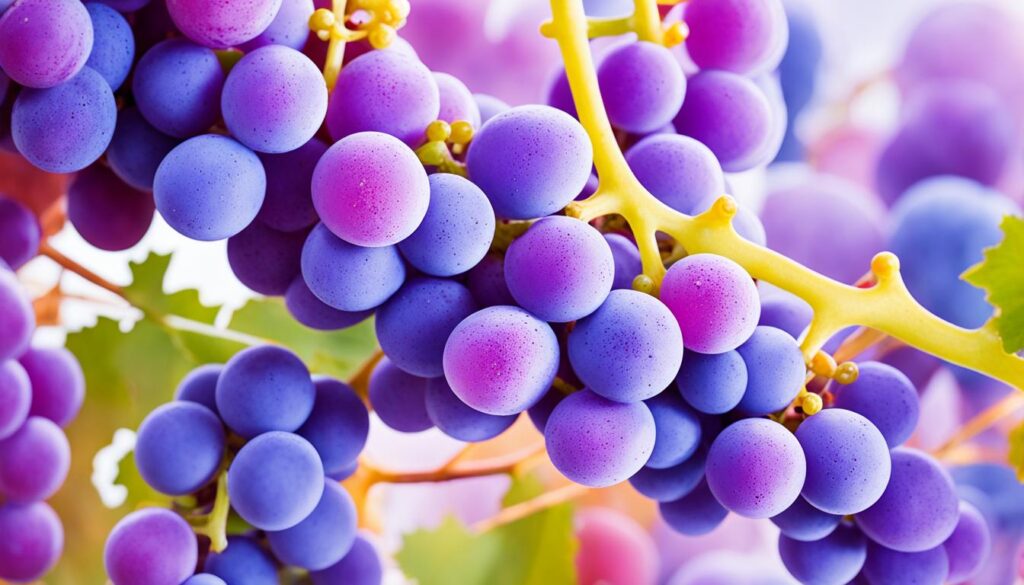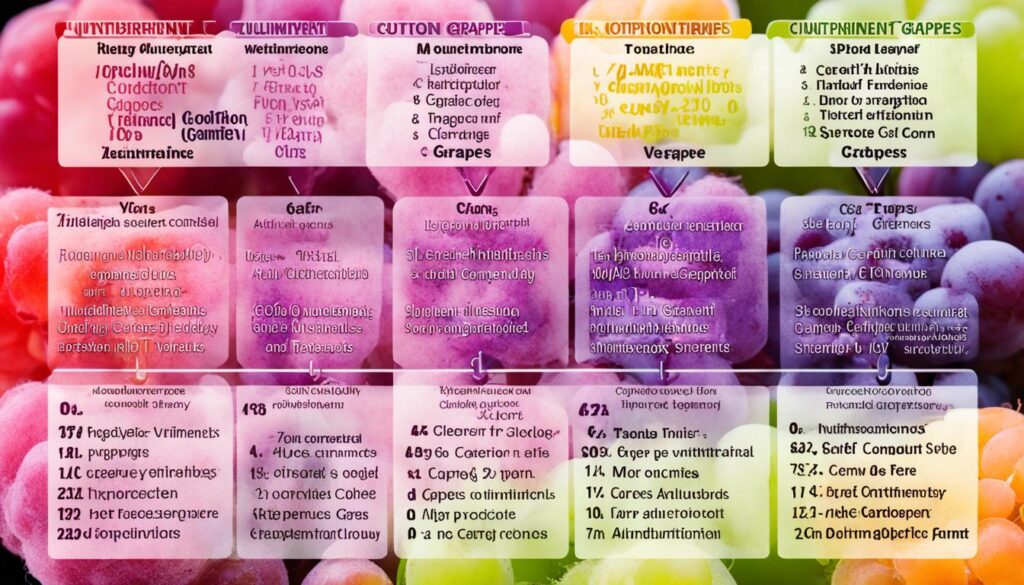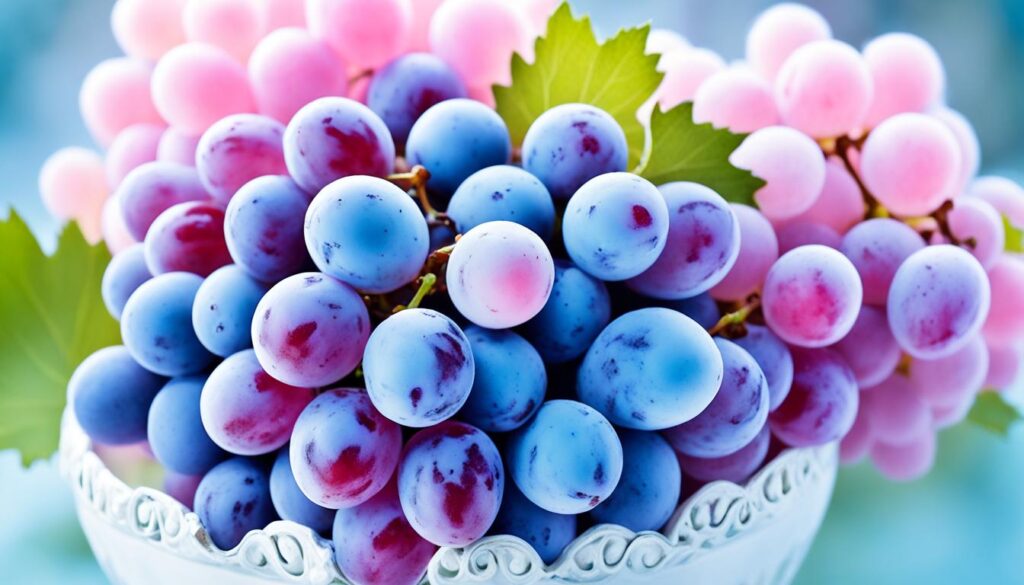Cotton Candy Grapes: Why They Taste Like Cotton Candy is a question that has intrigued fruit lovers and curious taste testers alike. These grapes offer an unexpectedly sweet flavor reminiscent of the sugary carnival treat, but how is this delightfuls taste achieved? In this post, we’ll dive into the fascinating process behind these grapes, exploring the unique cultivation methods and genetic modifications that give them their distinctive flavor. Join us as we uncover the secrets behind the Cotton Candy Grapes phenomenon.
Have you ever tried a grape that tastes just like cotton candy? These grapes are called “cotton candy grapes” and they’re loved for their sweet taste. But why do they taste so much like the sweet treat from the fair? Let’s dive into the story of how these grapes came to be.
The story of cotton candy grapes is about plant breeding and new fruit flavors. It’s a tale of how scientists and farmers work together to create new tastes. They use special techniques to make Cotton Candy Grapes that taste like cotton candy.
If you’ve ever bitten into Cotton Candy grapes, you might have been shocked by their uncanny resemblance to the sweet, fluffy carnival treat. Unlike artificially flavored snacks, these grapes get their natural candy-like taste through selective breeding, not genetic modification. But with such a sugary flavor, many people wonder—are Cotton Candy grapes bad for you? Let’s break down the facts.
What Are Cotton Candy Grapes?
Cotton Candy grapes are a special variety of green table grapes developed by plant breeders to have a naturally sweet, cotton candy-like flavor. They were created through crossbreeding different grape varieties, without the use of artificial flavoring or genetic engineering. Their higher fructose content gives them a much sweeter taste than regular grapes, making them a popular snack for those who love sweets but want a healthier option.
Are Cotton Candy Grapes Healthy?
Despite their name and candy-like sweetness, Cotton Candy grapes are still fruit, which means they offer essential vitamins, antioxidants, and fiber. They are rich in vitamin C, potassium, and polyphenols, which support immune health, heart function, and overall well-being. However, they do contain more natural sugars than regular grapes—around 18 grams of sugar per cup, compared to 15 grams in regular green grapes. While this is not a major concern for most people, those watching their sugar intake, such as diabetics, should consume them in moderation.
Key Takeaways
- Cotton candy grapes naturally taste like the sugary carnival treat due to a specific genetic mutation.
- These grapes are the result of cross-breeding different grape varieties, not genetic modification.
- The cotton candy flavor is a result of higher levels of certain aromatic compounds in the grapes.
- Cotton candy grapes are a healthy and nutritious fruit option, offering similar benefits to other grape varieties.
- The popularity of these unique grapes has sparked interest in exploring other innovative fruit flavors through selective breeding and cultivation.
The Unique Flavor of Cotton Candy Grapes
Cotton candy grapes have a special taste that reminds us of the sweet carnival treat. They have won over fruit lovers with their unique flavor. This makes eating them a special experience.
Exploring the Sweet and Fruity Notes
The secret to their flavor is in their mix of sugars and compounds. Cotton candy grapes have more fructose than regular grapes. This makes them super sweet.
They also have esters and terpenes that give off a fruity smell like cotton candy. This mix of sweet and fruity tastes is amazing.
When you eat a cotton candy grape, the flavors pop in your mouth. It’s like going back to the fun times of carnivals and childhood.
These grapes were made through careful breeding and genetic engineering. Growers picked the right traits for sugar and smell. This created grapes that taste amazing.
The Science Behind the Cotton Candy Taste
Exploring the cotton candy flavor of these grapes takes us deep into grape genetics and fruit flavor science. This unique taste comes from a mix of grape breeding and genetic changes. These changes use natural compounds to make a special taste experience.
The cotton candy taste comes from genetic factors in grape taste. Scientists found certain genes and reactions that make the sweet, fruity flavors. By changing grape types and genes, scientists made more of these flavors. This led to the cotton candy taste.
Discovering the cotton candy grape’s flavor was a journey in fruit genetics and horticultural techniques. Researchers learned about the grape’s chemical processes. They used this knowledge to change the grape’s genes. This made a unique and tasty experience for people.
| Genetic Factor | Role in Cotton Candy Taste |
|---|---|
| Terpene Production | Contributes to the sweet, floral aroma and flavor |
| Organic Acid Balance | Helps to balance the sweetness and provide a refreshing acidity |
| Sugar Content | Increases the overall sweetness and candy-like taste |
The science of the cotton candy taste in these grapes shows the power of grape breeding and fruit flavor science. As we learn more about fruit flavors, we’ll find more exciting tastes and experiences.

Why Do Cotton Candy Grapes Taste Like Cotton Candy?
Many people wonder why cotton candy grapes taste like the sweet treat. It’s all about genetics, biochemistry, and careful breeding.
Unraveling the Mystery of the Distinct Flavor
The secret flavor of cotton candy grapes comes from their genes. Scientists have worked for years to pick and boost the right genes. These genes make the grapes taste sweet and fruity, just like cotton candy.
They also changed the grapes’ sugar levels and the mix of compounds like esters and terpenes. This made grapes that really taste like cotton candy.
| Compound | Role in Cotton Candy Grape Flavor |
|---|---|
| Esters | Responsible for the sweet, fruity notes that mimic cotton candy |
| Terpenes | Contribute to the distinct aroma and taste profile of cotton candy grapes |
This new grape looks like a regular green grape but tastes like cotton candy. Its look and taste have made it very popular.
The Origins of Cotton Candy Grapes
The story of cotton candy grapes is about innovation in grape growing. This grape tastes just like the fluffy treat from carnivals. It has won over fruit lovers all over the world. Let’s explore how this special grape came to be.
Tracing the History of This Innovative Grape Variety
In the early 2000s, a team started working on a new grape. They wanted it to taste like cotton candy. They used grape hybridization and careful breeding to make it happen.
This grape was made through complex grape hybridization. They mixed different grape types to get the right taste. This way, they made a grape that tastes just like cotton candy.
| Grape Variety | Origin | Flavor Profile |
|---|---|---|
| Concord Grape | United States | Intense, grape-like flavor |
| Champagne Grape | France | Sweet, delicate, and floral |
| Cotton Candy Grape | United States | Sweet, reminiscent of cotton candy |
The history of cotton candy grapes shows how creative people can be in grape growing. Their hard work has given us a grape that is both unique and tasty. This grape keeps surprising and delighting fruit lovers everywhere.

Cross-Breeding and Genetic Engineering in Grapes
In the grape world, grape cross-breeding and grape genetic engineering have changed the game. They’ve made it possible to create new grape types with amazing flavors. Think of the beloved cotton candy grapes.
Grape hybridization techniques often use cross-breeding. This means mixing the genes of two grape types to make a new one. Breeders pick parents with certain traits to get grapes that taste better, are sweeter, or fight off diseases.
Genetic modification in grapes goes further with advanced methods. It can add or turn off genes to change grape plants. This way, breeders can make grapes taste sweet and fruity, like cotton candy grapes.
“The combination of cross-breeding and genetic engineering has unlocked a world of possibilities in the world of grapes, allowing us to create unique and captivating flavors that delight the senses.”
Thanks to these new ways, we now have many grape types, each with its own taste. From the famous cotton candy grapes to new ones, the future of grapes looks exciting. Grape lovers and growers have a lot to look forward to.
The Nutritional Value of Cotton Candy Grapes
Cotton candy grapes are a hit with their sweet taste. Many wonder if they are a healthy choice. These grapes are sweet but are they good for you?
Are These Sweet Grapes Healthy?
Yes, cotton candy grapes can be part of a healthy diet. They have more sugar than some grapes but are packed with nutrients and antioxidants. Let’s look at what makes them nutritious.
| Nutrient | Amount per 100g | Comparison to Regular Grapes |
|---|---|---|
| Calories | 104 | Slightly higher than regular grapes |
| Carbohydrates | 27g | Slightly higher than regular grapes |
| Sugars | 23g | Higher than regular grapes |
| Fiber | 1.4g | Similar to regular grapes |
| Vitamin C | 3.7mg | Comparable to regular grapes |
| Antioxidants | Moderate levels | Comparable to regular grapes |
Cotton candy grapes have more sugar but are still full of good stuff. Eating them in moderation is key to a balanced diet.

The health benefits of cotton candy grapes show they can be a tasty, nutritious choice. Enjoy them as part of a varied diet for the best health.
Comparing Cotton Candy Grapes to Other Grape Varieties
The world of grapes is always changing. Cotton candy grapes have become a hit with grape lovers. They are sweet and fruity, unlike many other grapes.
These Cotton Candy Grapes are special because of their sweet taste. They remind people of cotton candy. This makes them a favorite for those looking for something new and tasty.
| Grape Variety | Flavor Profile | Texture | Unique Qualities |
|---|---|---|---|
| Cotton Candy Grapes | Sweet, fruity, reminiscent of cotton candy | Firm, juicy | Hybrid grape variety, developed through selective breeding |
| Concord Grapes | Tart, with a pronounced grape flavor | Soft, juicy | Often used for jams, juices, and wine |
| Muscat Grapes | Floral, with a distinct musky aroma | Firm, with a crunchy texture | Commonly used in dessert wines and as a table grape |
| Thomcord Grapes | Sweet, with a blend of Concord and Thompson Seedless flavors | Firm, juicy | A hybrid grape variety with a unique flavor profile |
The table shows how cotton candy grapes are sweeter and taste different from other grapes. They offer a sweet surprise that other grapes don’t. This makes them a fun choice for grape lovers.
Cotton candy grapes come from mixing different grape types together. This makes them special and unique. It also opens up new tastes for grape fans to try.
More and more people are trying new grape types, like cotton candy grapes. They like the new tastes they offer. By learning about these grapes, grape fans can enjoy the wide range of flavors out there.
Cultivating and Growing Cotton Candy Grapes
To grow cotton candy grapes, you need to know how to care for them. Whether you’re new or experienced, learning about grapevine horticulture is key. We’ll share tips on soil, care, and maintenance for a great harvest.
Ideal Soil and Climate Conditions
Cotton candy grapes do well in soil that drains well and is rich in nutrients. The soil should be a bit acidic, between 6.0 and 6.5 pH. These grapes love full sun, needing 6-8 hours of sunlight daily.
They grow best in a climate like the Mediterranean, with warm summers and mild winters. This climate helps them thrive.
Trellis and Pruning Techniques
Supporting the grapevines is important for growing cotton candy grapes. Use a strong trellis, like the VSP method, to keep vines in check. This also ensures they get enough air and sunlight.
Pruning is key. Do it in the off-season and during the growing season. This keeps the plant strong and helps the fruit grow well.
Irrigation and Nutrient Management
Good care is crucial for cotton candy grapes. Use a smart watering system that waters deeply but not too often. This helps the vines grow strong roots.
Adding organic matter and a slow-release fertilizer gives the grapes what they need to grow and produce well.
Learning how to grow cotton candy grapes lets growers enjoy their sweet taste. With the right soil, climate, and care, you can grow these tasty grapes.

Unique Flavors in the World of Grapes
The world of grapes is full of diverse and new flavors. There are more grape types than just the usual ones. They offer a wide range of tastes, from sweet to bold.
These unique tastes come from grape breeders and researchers. They work hard to create new grape types. They look into grape genetics to find new flavors. This makes eating more exciting and opens new doors in grape research.
| Grape Variety | Flavor Profile |
|---|---|
| Cotton Candy Grapes | Sweet, Fruity, Reminiscent of Cotton Candy |
| Concord Grapes | Intense, Grape-y, Slightly Tart |
| Muscato Grapes | Delicate, Floral, Subtly Sweet |
| Black Monukka Grapes | Bold, Earthy, Slightly Spicy |
Exploring grapes reveals many new and exciting types. You’ll find everything from sweet cotton candy grapes to bold ones. This shows how much effort goes into making new grape flavors.
“The pursuit of unique grape flavors is not just about satisfying our taste buds, but also about expanding the horizons of what’s possible in the world of agriculture and food innovation.”
The Impact of Grape Genetics on Flavor Profiles
Different grape varieties have unique flavors thanks to grape genetics. By looking into how genetics and biochemistry work together, we learn how grapes get their taste. This helps us understand how genetics affects the flavor of grapes.
Exploring the Role of Genetics in Fruit Flavors
Grape genetics are key to the special tastes of different grapes. They help make aromatic compounds and control sugar and acid levels. This makes each grape taste unique. By studying how genetics and flavor work together, we learn about the science of grape flavors.
| Genetic Factors | Influence on Grape Flavor |
|---|---|
| Volatile Compound Synthesis | Responsible for the production of aromatic compounds that contribute to the grape’s aroma and taste |
| Sugar Metabolism | Regulates the levels of sugars, which play a crucial role in the sweetness and overall flavor profile of grapes |
| Acid Synthesis | Determines the acidity levels, balancing the sweetness and creating a harmonious flavor experience |
Knowing how grape genetics and flavor work together helps researchers and grape growers. They can make new grape types that people will like more. This science can also improve grape varieties we already know.
“The genetic factors that influence grape flavor are a fascinating area of study, as they reveal the complex interplay between nature and the development of unique taste experiences.”
The Future of Innovative Grape Varieties
The world of grape breeding is entering a new era. Researchers and horticulturists are working on future grape varieties for today’s consumers. They aim to create new grape varieties with unique flavors and upcoming grape innovations that go beyond what we know.
People now want grapes that offer more than just taste. Grape breeders are answering this call. They use new plant genetics and crossbreeding to create future grape breeding possibilities. This could change how we enjoy grapes.
- Exploring new genetic mixes for new grape varieties with unique tastes
- Using advanced tech to speed up the evolution of grape flavors
- Meeting the demand for upcoming grape innovations that excite the senses
The grape industry is always changing. The future of grape breeding promises more amazing grape varieties that will amaze us. We can look forward to sweeter, more fragrant grapes and ones with special colors and textures. Grape breeders are listening to what consumers want and using future grape innovations to shape the evolution of grape flavors.
Incorporating Cotton Candy Grapes into Recipes
The sweet and fruity taste of cotton candy grapes opens up new cooking ideas. These grapes add a special touch to both sweet and savory dishes. They can make your cooking fun and exciting.
Recipes Featuring Cotton Candy Grapes
Cotton candy grapes are great in fruit salads. They add sweetness and a unique flavor. Mix them with berries, melon, and kiwi for a fresh and pretty dish. Or, use them in a homemade sorbet or popsicle to show off their taste.
Want to spice up your baked goods? Add cotton candy grapes to muffins, scones, or a rustic tart. Their sweetness goes well with buttery pastries, making a nice mix of flavors.
Savory dishes can also use cotton candy grapes. Put them in salads, grain bowls, or roasted vegetable mixes for a sweet surprise. They’re great with many foods, making your meals more interesting.
| Recipe | Description |
|---|---|
| Cotton Candy Grape Salad | A refreshing and colorful fruit salad featuring cotton candy grapes, berries, and a light honey-based dressing. |
| Cotton Candy Grape Sorbet | A creamy and intensely flavorful sorbet made with the natural sweetness of cotton candy grapes. |
| Cotton Candy Grape Muffins | Moist and tender muffins with a delightful burst of cotton candy grape flavor in every bite. |
Using cotton candy grapes in your cooking lets you make dishes that will wow your family and friends. Try these grapes and see how they can make your cooking special.
The Consumer Demand for Unique Fruit Flavors
Consumers are now looking for new and exciting fruit flavors. This has made unique grape varieties like cotton candy grapes very popular. These grapes have become a hit with fruit lovers all over the country.
There’s a big market for special fruits with unique tastes. This has led to many new grape types. Each one offers a special and tasty experience.
| Consumer Trends in Fruit Flavors | Demand for Innovative Grape Varieties |
|---|---|
| Increased interest in novel and unique fruit flavors | Growing demand for grapes with distinctive tastes |
| Preference for fruits that offer a sensory adventure | Popularity of grape varieties like cotton candy grapes |
| Willingness to explore beyond traditional fruit options | Consumers seek out unique and unexpected grape flavors |
Cotton candy grapes are a great example of this trend. Their sweet and fun taste has won over many fruit fans. More and more people want to try these grapes because they offer a new kind of fruit experience.
Fruit growers and breeders are now trying new things to make grapes that fit what consumers want. They aim to please those who like to try new things and care about their health.
“The demand for unique fruit flavors is reshaping the produce industry, as consumers actively seek out new and exciting taste experiences.”
Who Should Be Cautious?
While Cotton Candy grapes are safe for most people, those with diabetes or insulin resistance should be mindful of portion sizes. Eating too many can add up in sugar and calories, which may affect blood sugar levels. Additionally, since they taste so much like candy, they could trigger cravings for other sugary foods in some individuals. That being said, when eaten in moderation, they make a great alternative to processed sweets and can satisfy sugar cravings in a more natural way.
Final Verdict: A Sweet Yet Healthy Treat
Cotton Candy grapes may taste like candy, but they are a natural, nutritious fruit that can be part of a healthy diet. They offer vitamins, antioxidants, and fiber, making them a better alternative to sugary snacks. However, due to their higher natural sugar content, moderation is key, especially for those monitoring their sugar intake. If you’re looking for a fun and tasty way to enjoy fruit, Cotton Candy grapes are a guilt-free indulgence that brings a touch of sweetness to a balanced diet!
Conclusion
The cotton candy grape is a special fruit that has caught everyone’s attention. It tastes like the sweet treat from fairs, thanks to its unique flavor. This grape’s story shows how new fruits can change what we think about taste.
This grape’s creation shows the power of new grape varieties. By using science, breeders can make grapes taste in new ways. This has opened up new possibilities for fruit lovers.
With the cotton candy grape, we see a future full of new fruit flavors. The horticulture world is always finding new ways to surprise us. The cotton candy grape is just the start of more exciting fruits to come.







